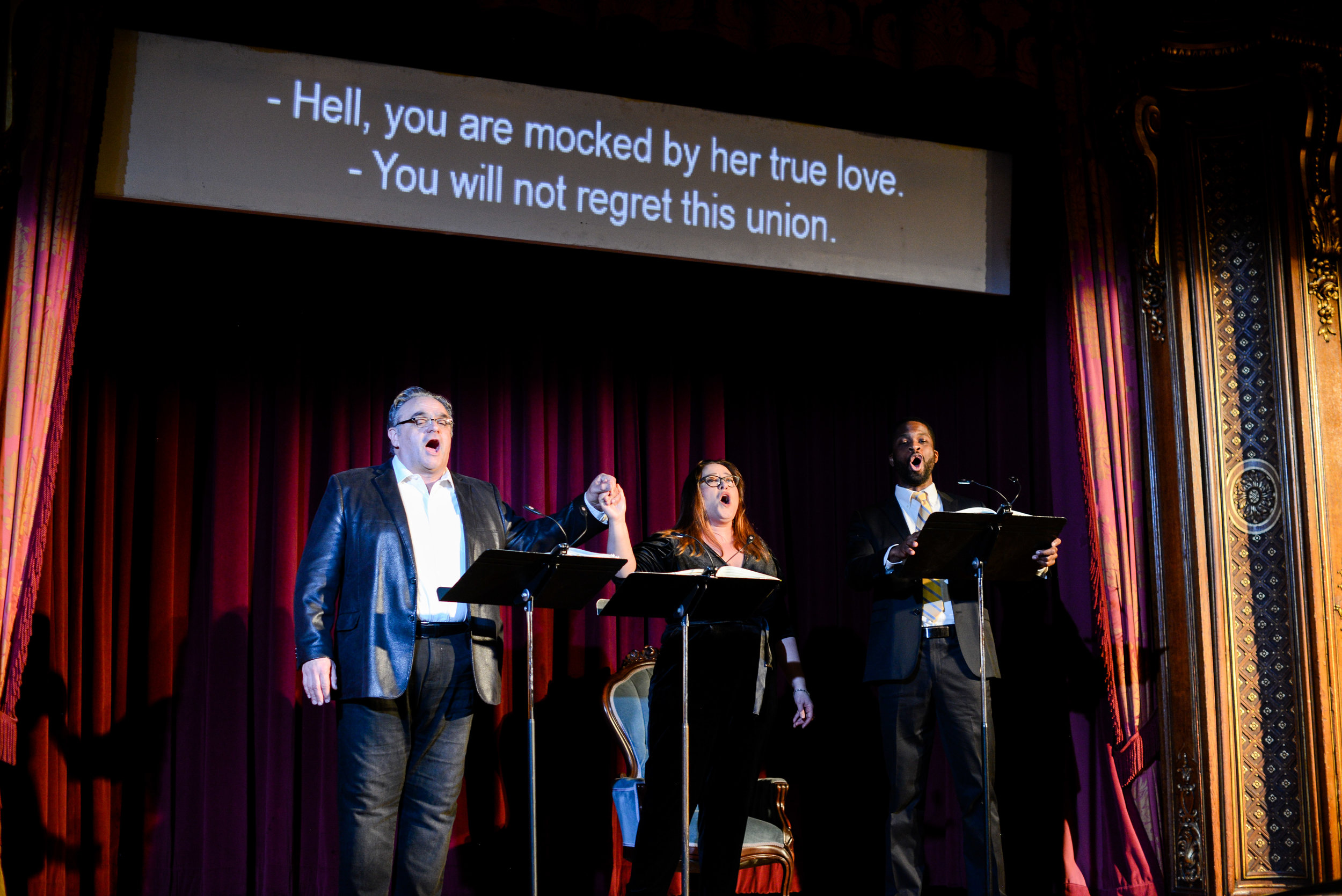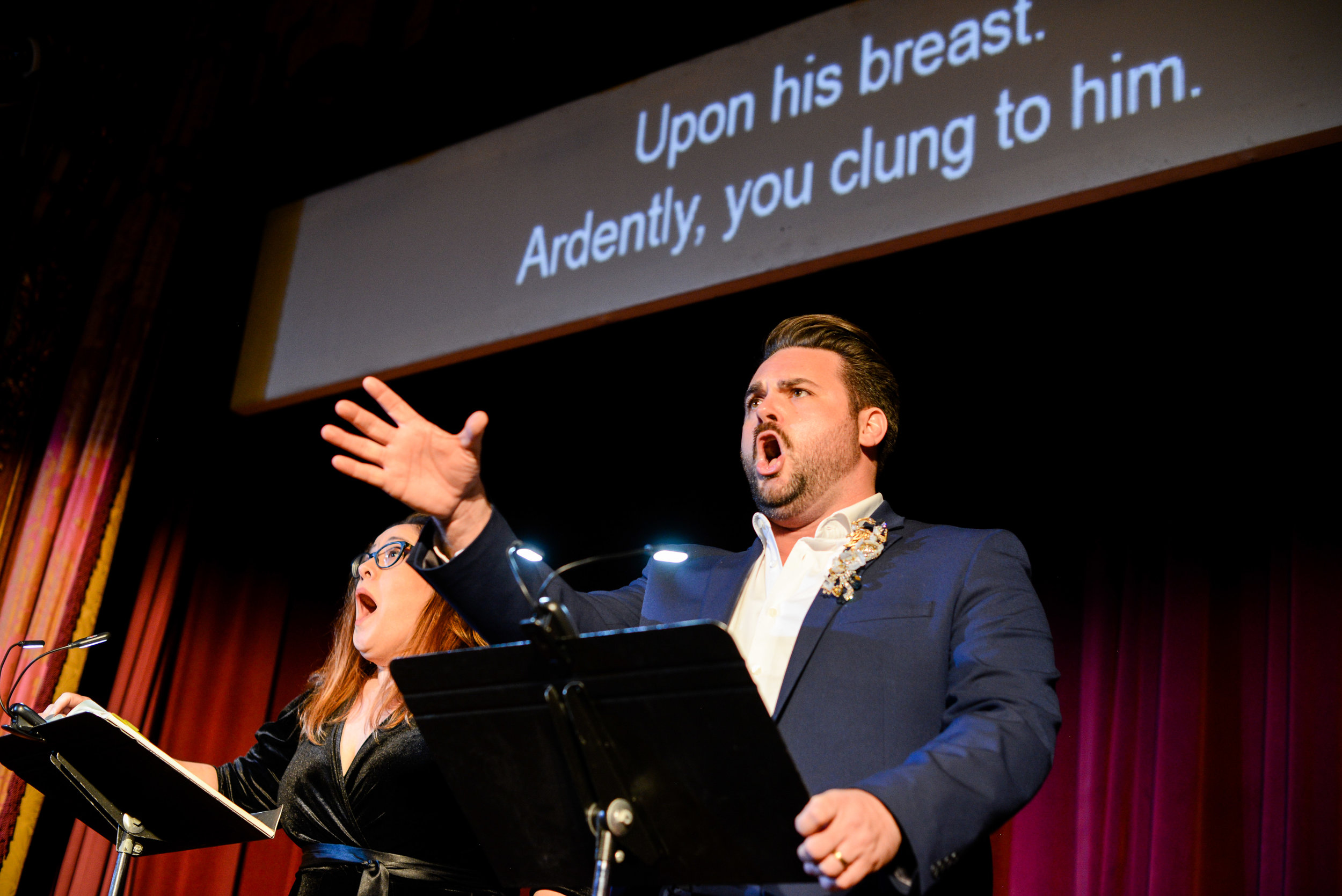Depiction of the last scene of The Flying Dutchman (1843); artist unknown. Public domain; from Wikipedia.
Baltimore Concert Opera gave a stirring performance of Richard Wagner’s The Flying Dutchman (Der Fliegende Höllander in german,1843) on Sunday afternoon, maybe the best in terms of impact of their productions I have seen. However, there is an important point to be made before I give you the remainder of my report. Word has gotten around about Baltimore Concert Opera. I am pleased to have been introduced to this opera company when you could get a ticket last minute, but that is increasingly not the case. The Dutchman was sold out; their next production, Scalia/Ginsburg and Trial by Jury, is also sold out (I suggest a possible work around in The Fan Experience section below if you really, really want to see Scalia/Ginsburg). Even BCO’s “Thirsty Thursdays” events are starting to sell out. There are reasons for this: their performances and events are engaging and fun and performed in a lavish and cozy setting, and they are a bargain. You have been warned – plan ahead and get your tickets early; in fact, it may be time to seriously consider getting a season subscription for next season.
Let’s begin with a short synopsis of this opera which is based on a myth from the 17th century that composer Richard Wagner adapted for his purposes – the Dutchman is the captain of a ghost ship who must sail the seven seas until he finds a true love that will remain faithful forever. Once every seven years he is allowed to go ashore to search for the woman who will be faithful to him for eternity. A storm drives his ship into a port where he encounters another captain, Daland, who has a daughter, Senta, that he is willing to betroth to the Dutchman for the great wealth he will gain. Senta who is obsessed with the legend of the Dutchman is more than willing to accept the proposal. Unfortunately, the Dutchman later sees her with another pursuer, Erik, and thinks she has reneged and starts out to sea without her despite her protestations. She proves her faithfulness by leaping off a cliff into the sea. The ship disappears, and the Dutchman and Senta ascend to heaven in embrace. Only opera can turn leaping to your death into a happy ending.
The Baltimore Concert Opera Chorus with Conductor and Pianist James Harp at the piano and Assistant Conductor Ryan Tani seated. Photo by Britt Olsen-Ecker and courtesy of Baltimore Concert Opera.
The Flying Dutchman is probably the gentlest opera of Wagner’s for newbies to get indoctrinated into his music. I have to admit, though, I was wondering what the effect of hearing Wagner without an orchestra would be. BCO performances are with only piano providing accompaniment to the singers. At first, I missed the orchestra; the overture to the Dutchman is one of Wagner’s best. And in truth, as good as it was, Conductor and Pianist James Harp’s short overture on the piano was no match for a 60-piece orchestra going on for another ten minutes, but I must also add that he provided fine accompaniment throughout the performance portraying both a roaring storm and gentle ballads with a deft touch. A very enjoyable feature of this opera is Wagner’s extensive use of choruses, and BCO gave us three, a real treat, especially in the cozy setting of the Engineer’s club. The male members of the BCO Chorus kicked off the opera singing the strong-voiced Norwegian crew chorus. The female members added to the pleasure at the beginning of the second act as young women singing the delightful and popular spinning song. The Maryland State Boychoir entered in Act III to sing the role of the Ghost Chorus, the Dutchman’s crew, capping the afternoon’s surfeit of excellent singing by the choruses. Kudos to Maestro Harp and Assistant Conductor Ryan Tani for their work with these crews.
Todd Thomas as the Dutchman. Photo by Britt Olsen-Ecker and courtesy of Baltimore Concert Opera.
It’s amazing how, on rare occasion, a single performer will cause me to relax and have confidence that I am really going to enjoy the proceedings. Sunday afternoon, baritone Todd Thomas was that performer. On his entrance, his demeanor, voice, and singing said “I am the Dutchman” (well, all right then), and he anchored this production from thereon with a voice well suited to the part and with his ability to transmit both weary hopelessness at his unhappy fate and cautious relief that his suffering might not be in vain. Senta was played by soprano Alexandra LoBianco whose voice I really enjoyed. Senta is a fascinating character to me. I’m never sure whether she exists in some altruistic metaphysical realm or has simply gone bonkers. Ms. LoBianco sang Senta with less power than most Senta’s I’ve heard (though she certainly turned it on a couple of times), choosing to spend her time in the high registers with a soft, at times eery, yet beautiful sound suggesting madness. Her portrayal was of an obsessed and resolute Senta, an effective and distinguished characterization.
Alexandra LoBianco as Senta. Photo by Britt Olsen-Ecker and courtesy of Baltimore Concert Opera.
Another major role in the Dutchman is Senta’s father, Daland who was played credibly by bass-baritone Justin Hopkins who has a rich, warm sound. Senta’s father is also an interesting character: Is he a somewhat comedic figure whose eyes get large when he sees a chance to grab some gold and sees no problem with picking a rich suitor for his daughter, or is he a more sinister character willing to sell his daughter for his own profit? BCO and Mr. Hopkins chose the former characterization which drew some laughs, perhaps offering some comedic relief for an intense drama. Personally, my preference runs toward maintaining the intensity of the drama. Myths and stories from long ago can have the suspension of disbelief broken if the audience finds something funny that shouldn’t be funny. BCO largely avoided this.
left: Todd Thomas as the Dutchman, Alexandra LoBianco as Senta, and Justin Hopkins as Daland. right: Alexandra LoBianco as Senta and Dane Suarez as Erik. Photo by Britt Olsen-Ecker and courtesy of Baltimore Concert Opera.
The role of Senta’s would-be beau, Erik, was played by tenor Dane Suarez. Mr. Suarez’s singing was another highlight of the performance, though he looked rather suave to be a provincial, hunter type. He and Senta have a stirring duet where he reveals a dream he had of Senta going away with a sea captain dressed in black, which disturbs Erik but inflames Senta’s passion, well done by both singers, though the audience did find comedy in the contrast between their reactions. Other performers who ably supported the drama were tenor Orin Strunk who sang the role of the Steersman and mezzo-soprano Kate Farrar who sang the role of Senta’s Nurse who vainly sought to move Senta away from her obsession with the ghost captain. Mr. Strunk had a lovely, well delivered aria of longing for his sweetheart, though there was some uncertainty in his mid-range early on.
Overall, this cast brought this story home, hale and hearty fare, and I’ve been chewing on it quite a bit since then. I decided to listen once more to a recording of the Dutchman. Yes, hearing the overture delivered by an orchestra was again marvelous, but I also discovered to my surprise that my appreciation for this opera had grown significantly. Somehow, attending the BCO concert version has opened me up even more to the fully-staged opera. With the BCO version under my belt, I am enjoying and appreciating even the orchestral music more. In fact, I now realize that this is a much better opera than I thought before and would like to see it again. Hmmm; how did that happen?
The Fan Experience: As noted in the above report, Baltimore Concert Opera’s last opera production of the year, Scalia/Ginsberg and Trial by Jury, coming up on April 5 and 7, is sold out. You can get on a waiting list, but here is something you may not know. BCO often collaborates with Opera Delaware to co-sponsor a production – a concert version by BCO, then a fully-staged version by Opera Delaware with the same cast for both. Guess what? This is the case for Scalia/Ginsburg and Trial by Jury. Opera Delaware’s performances are coming up April 28 and May 3, and of this writing, tickets are still available. These performances are part of their 2019 Festival which also features Jake Hegge’s opera, Dead Man Walking. Opera Delaware performs in The Grand Opera House in Wilmington, less than 70 miles up I-95 from Baltimore. Tempting, isn’t it?






